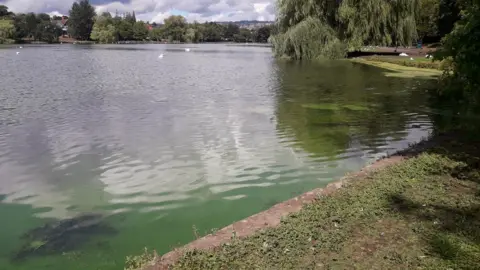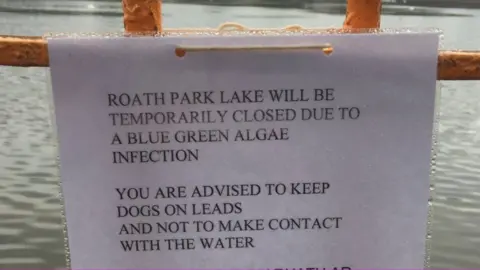Why blue-green algae can be toxic to pets and humans
 NRW
NRWThe recent hot weather has sped up growth of blue-green algae in lakes across Wales and the UK.
Varying types of the algae occur naturally in the water cycle of rivers and lakes, and in certain conditions they can bloom into a green colour.
The level of nutrients in the water, temperature and the amount of rain all play a part in leading to a bloom.
But blue-green algae are toxic and can cause illness in humans and even lead to death in animals.
Dr Mike Bowes, from the Centre for Ecology & Hydrology, said: "They flourish in hot weather and dry conditions which speeds up growth.

"Most problems in Wales will be found in lakes and ponds as the flow is generally sufficient in most rivers in Wales to prevent algae building up in large numbers. "
The algae has been found in Llyn Pencarreg near Llanybydder, Carmarthenshire, Fagal Lane Quarry in Flintshire, North Dock in Llanelli, Tremains Wood near Brackla in Bridgend county, Parc Acton in Wrexham and Roath Park in Cardiff.
"Blue-green algae are potentially fatal to animals. They produce toxins that can cause damage to the liver or nervous system," Dr Bowes said.
According to Natural Resources Wales, it is very hard to predict when they will bloom and there are no quick solutions for blue-green algae once they appear in a lake or pond.
What can happen?
Public Health Wales says side effects of coming into contact with the toxins include:
- Skin rashes
- Nausea
- Vomiting
- Stomach pains
- Fever
- Headaches

In rare cases, the algae can cause liver and brain damage.
Public Health Wales says anyone who has come into contact with the algae should shower with fresh water immediately.
Blue-green algae cause the biggest problems for animals such as dogs.
The RSPCA said: "Exposure to these toxins can cause serious health problems for dogs and can even prove fatal.
"We'd urge dog walkers and owners to keep their pets away from any body of water that you suspect may contain blue-green algae. Don't let them paddle or swim in the water and don't let them drink from it.
"If you are concerned your dog may have been exposed to blue-green algae or your dog is vomiting, disorientated, excessively drooling, having difficulty breathing, suffering diarrhoea, collapses or suffers seizures, please contact a vet immediately."
